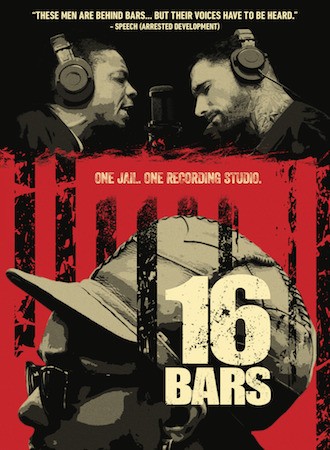
16 Bars 2019
Distributed by The Video Project, 145 - 9th St., Suite 102, San Francisco, CA 94103; 800-475-2638
Produced by Joe Lamont, Eric Michels, and Adam Barton
Directed by Sam Bathrick and Adam Barton
Streaming, 94 mins
College - General Adult
Art; Criminal Justice; Sociology
Date Entered: 04/13/2020
Reviewed by William Blick, Electronic Resources Librarian, Queensborough Community College16 Bars is a powerful and moving account of redemption through music. It traces the path of several prison inmates from Richmond Virginia Justice Center that are soon to be released into society, and some recently paroled. The film reveals the broken and fragmented lives of these individuals, who instead of travelling the same deeply ingrained patterns, try to break their cyclical lives of crime.
The film, never judgmental, and maintaining a certain distance and objectivity, allows the subject matter to speak for itself. The film is reminiscent of the aesthetic that renowned documentarian Frederick Wiseman uses; that of “direct cinema”. Never preachy, and always enlightening, it allows the viewers to put themselves, at a distance, into the shoes of these souls engaged in battle not only for their survival, but for redemption. They see that chance through music.
The individuals in the film take full advantage of the voluntary resources that are offered to them, including a mentorship by the founder of hip-hop giant, Arrested Development, “Speech” Thomas. Offered a chance to create with a full recording studio at their disposal, the individuals create a street prose, rap, and raw spoken word that speaks to the core of their battles with drugs and street life.
As the film unfolds, the viewer catches a glimpse of the early lives that shaped their cyclical poverty, drug addiction, and crime. While this background is significant, the films never uses it to excuse the issues at hand, and, rather, allows the viewer to see the choices that the incarcerated individuals have made, and permits the viewer to draw his or her own conclusions. However, the films do not focus or dwell on the problems but seems to draw on the strength and efforts to transcend the subjects’ bleak lives.
While some viewers may feel an indifference or mixed emotions about the crimes committed by the subjects, the film is likely to sway opinion to that of empathy. The film’s primary focus seems to be that of empathy. Yet, the controversial nature of the film, may leave other viewers to turn a blind eye, the film cannot help but have a positive and encouraging message.
Ultimately, the filmmakers’ message is one that cannot be ignored as the statistical information is revealed amount the prison population in the United States being the largest in the world, and filled mostly with, African American men. Teddy, a recent parolee, 4 days released, explains the choice his father gave him as a young adolescent to be either a “sheep” or a “wolf”. His father says if he wants to be a sheep, or a meek individual who is taken advantage of, then he should live with his mother. If he wanted to be a wolf, he should stay with his father. Not having a positive male influence, and surrounded in a world of drugs and crimes, the choices of Teddy became limited and obvious. Again, Teddy takes responsibility for his actions, but focuses on the solution.
Technically, the film is professional and astute. Never stylized or intrusive with its methodology, the film as a gritty, raw aesthetic, given the subject matter. Much has been written about these social problems and films have been made in a similar vein. Therefore, it is possible that 16 Bars may become “white noise” amongst the backdrops of other films. Yet, inevitably this film is a powerful testament to the power of the arts to transform and transcend, as we see the outlet for self-expression to be a tool to facilitate change.
This film would be a welcome addition to any libraries list of offerings and is particularly useful on a community college in larger cities. It can be used in criminal justice, sociology, or general education classes as a powerful didactic tool that is surely to useful to facilitate and generate discussion amongst students. This an important and powerful film, despite its deeply tread subject matter. It adds to the discussion, and its positive dwelling on the solution is infectious. It is highly recommended.
Awards
WINNER: Audience Choice, DocLands; Best Documentary, Downtown LA Film Festival
OFFICIAL SELECTION: DOC NYC; Virginia Film Festival; MKE Film Festival; DTLA Film Festival; DocLands; Miami Film Festival; Big Sky Film Festival; Human Rights Film Festival